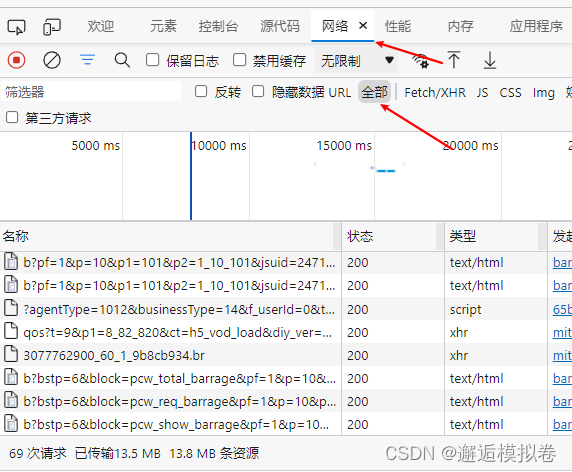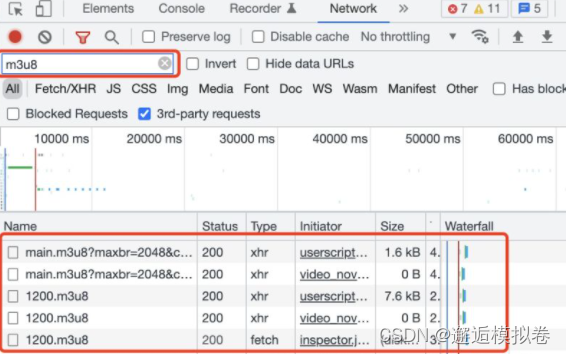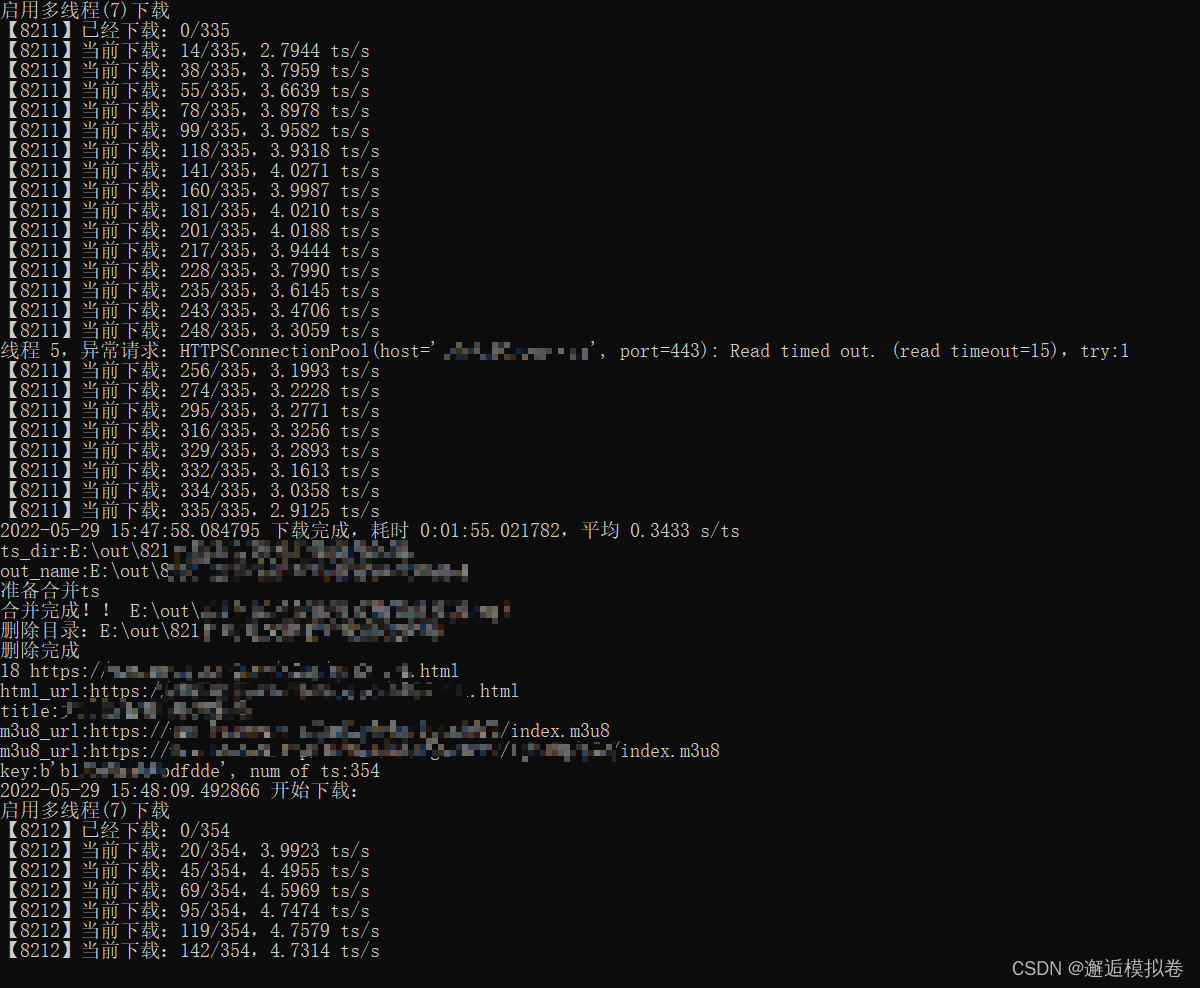- 1【C库函数】 strstr函数详解
- 2RK3568开发笔记(八):开发板烧写buildroot固件(支持hdmi屏),搭建Qt交叉编译开发环境,编译一个Demo,目标板运行Demo测试_瑞芯微rk qt交叉编译
- 3节点小宝——一款好用、易用、高速、安全的远程管理工具
- 4YOLO算法之YOLOv5
- 5pycharm配置copilot_pycharm设置copilot步骤
- 6轨道线检测_轨道线检测的python代码
- 7python中国非物质文化遗产网站设计与实现flask-django-nodejs-java_互联网加+非遗产品的运用到的python技术
- 8SpringCloud微服务学习日志-RabbitMQ_微服务日志统一处理通过mq存表
- 9EventBus解析并实现手写EventBus
- 10oracle中的 符号怎么用,Oracle中sql语句(+)符号代表连接的使用讲解
通过python多线程下载基于m3u8和ts的视频文件_ts视频用多少线程下载最快
赞
踩
开篇介绍
需求和使用场景
有些时候想要把在线观看的视频保存下来,或由于在线看很卡顿想离线看,但官方并没有提供下载工具,如果使用录频软件则电脑同时不能进行其他操作,而且有些电影看过一遍也不会想再看,因此想到用脚本下载。
在浏览器种按F12查看网络情况,发现下载的都是ts文件:(图片为其他图片,和本文没关系,只是介绍查看的方式)

因此,本脚本只适用于下载基于m3u8和ts的视频。
知识背景
查阅相关blog了解到,ts文件是切片的视频,一般几秒钟不等,而浏览器加载ts的前提是先获取到了对应m3u8文件,所有ts的url都在该m3u8文件中。

而m3u8文件一般在对应视频网页刚打开的时候加载的。
因此可以联想到,先请求url得到m3u8,再通过解析m3u8下载ts,最后将所有切片的ts合并,得到完整的视频!
组成部分
那么需要解决的问题就分为以下几个部分:
- 解析视频url得到m3u8_url
- 解析m3u8_url得到ts_url
- 下载ts
- 合并ts
下载
解析视频url得到m3u8_url
这里主要做了几个工作:
- 检查cookies是否过期,如果过期了需要重新登录获取cookies;
- 如果网页请求失败,可能是网址打错了,也需要退出程序;
- 获取视频标题:如果批量下载的话,使用网页上显示的标题最方便给保存的视频命名;
- 获取m3u8的地址:这也是最主要的工作;
def _check_url(self, html_url): """ 从url获取 title 和 m3u8_url """ print(f"html_url:{html_url}") html = requests.get(html_url, headers=headers, cookies=cookiejar_from_dict(self.cookie_dict)).text if '您没有权限访问此数据' in html: print(f"update cookie:") self.cookie_dict = get_cookie_dict() return self._check_url(html_url) elif 'vcontainer' not in html: print(f"{type(html)}") print(html) print('404') return False soup = BeautifulSoup(html, "html.parser") iframes = soup.find(class_='video-title') for iframe in iframes: self.title = iframe.text print(f"title:{self.title}") iframes = soup.find(class_='vcontainer') for iframe in iframes: if 'index.m3u8' in iframe.text: match_res = re.search('https:.*index[.]m3u8', iframe.text) if match_res: self.m3u8_url = match_res.group().replace("\\/", "/") return True else: print('not find m3u8_url') return False
- 1
- 2
- 3
- 4
- 5
- 6
- 7
- 8
- 9
- 10
- 11
- 12
- 13
- 14
- 15
- 16
- 17
- 18
- 19
- 20
- 21
- 22
- 23
- 24
- 25
- 26
- 27
- 28
- 29
其中,获取cookies可以单独写一个函数:
def get_cookie_dict(): """ 获取登录的cookie。 如果需要验证码则会更麻烦一点,然而一般需要验证码登录的网站都提供了下载方法。 """ login_url = 'https://www.xxxxxx.com/user/login.html' # 改为对应网站的登录页 headers = { 'Content-Type': "application/json" } payload = { "user_name": "xxxxxx", "user_pwd": "xxxxxx" } try: res = requests.post(url=login_url, headers=headers, json=payload) cookie_dict = dict_from_cookiejar(res.cookies) print(f"cookie_dict = {cookie_dict}") return cookie_dict except Exception as err: print('获取cookie失败:\n{0}'.format(err))
- 1
- 2
- 3
- 4
- 5
- 6
- 7
- 8
- 9
- 10
- 11
- 12
- 13
- 14
- 15
- 16
- 17
- 18
- 19
- 20
cookie有两种格式,一个是dict,另一个是cookiejar。
dict的长这个样子
cookie_dict = {‘xxx’: ‘xxx’, ‘xxx’: ‘x91%98’, ‘user_check’: ‘00c2xxx809’, ‘user_id’: ‘xxx’, ‘user_name’: ‘xxx’, ‘user_portrait’: ‘%2Fsxxmagesx’}
如果不知道可以看浏览器中的请求头,一般登录之后会生成一个新的。如果这个dict过期了获取一个新的就行,这里不过多介绍。
此外,用的时候最好确认一下m3u8的格式,需要根据实际情况修改对应的正则表达式:
re.search('https:.*index[.]m3u8', iframe.text)
- 1
如果有多个.m3u8的url那也需要另作判断,这都不是大问题。
解析m3u8_url得到ts_url
得到 m3u8_url 之后就需要继续请求 m3u8_url ,并且解析里面的内容。
def _check_m3u8_url(self, m3u8_url): """ Args: m3u8_url: 'https://www.xxxxxx.xxxxxx/xxxxxx/index.m3u8' """ print(f"m3u8_url:{m3u8_url}") datas = requests.get(m3u8_url, headers=headers).text key = None # print(datas) for line in datas.split('\n'): if line.endswith('.m3u8'): idx = m3u8_url.find(line[:7]) new_m3u8_url = m3u8_url[:idx] + line return self._check_m3u8_url(new_m3u8_url) elif 'key.key' in line: # print('key:', line) key_url = re.search('https:.*key[.]key', line).group() key = get_key(key_url).encode('utf8') self.aes = AES.new(key, AES.MODE_CBC, key) elif line.endswith('.ts'): # print('ts:', line) self.ts_url_list.append(line) print(f"key:{key}, num of ts:{len(self.ts_url_list)}") return self.ts_url_list
- 1
- 2
- 3
- 4
- 5
- 6
- 7
- 8
- 9
- 10
- 11
- 12
- 13
- 14
- 15
- 16
- 17
- 18
- 19
- 20
- 21
- 22
- 23
- 24
因为我这个网站的 m3u8_url 又包了一层,所以用了递归的思路,如果发现里面还有m3u8_url,则继续访问这个,如果发现很多.ts的url,才下载ts。
注意到,ts文件可能是加密的,直接下载下来会打不开,或者是花屏,则需要看m3u8文件中有没有表明加密格式。这里展示的是用AES.MODE_CBC加密的情况,其中密钥在.key文件中,这key的url也在m3u8文件中。
那获取key就很简单了,其实就是一串字符串
def get_key(key_url):
"""
Args:
key_url: 'https://www.xxxxxx.com/xxxxxxxxxxx/key.key'
Returns:
b'xxxxxx'
"""
return requests.get(key_url, headers=headers).text
- 1
- 2
- 3
- 4
- 5
- 6
- 7
- 8
这里顺便提供一个测试脚本,比如已经下好了没有解密的ts文件,可以测试一下解密方式对不对
from Crypto.Cipher import AES
key = b'efe42adecfbddfbb'
aes = AES.new(key, AES.MODE_CBC, key) # 创建一个aes对象
data_in = open('./out/00001.ts', 'rb').read()
data_out = aes.decrypt(data_in)
with open('outts_decrypt.ts', 'wb') as f:
f.write(data_out)
- 1
- 2
- 3
- 4
- 5
- 6
- 7
- 8
- 9
一般下载的时候顺便解密了,这样每个ts文件也能打开播放了。
多线程下载ts
这里提供三个多线程的方式:
- 方法一:多线程共享下标,顺序下载,这种方式用到了全局变量,所以会比较慢。
- 方法二:多线程固定各自的下标,比如10个线程评分1/10的量,这种比较快,但会存在9个线程下完了等待最后一个线程慢慢下的情况。
- 方法三:在方法二的基础上,不保存每个ts文件,将对应的二进制串暂存在内存里,等下完了直接合并为完整的视频。(方法一和方法二还需要后面
合并ts的步骤,但其实硬盘读写的速度比较快,合并完了再删也不会花多少时间,而且还方便了中间结束程序,之后继续下载剩余的ts文件)。
方法一:多线程共享下标,顺序下载
def load_ts_video_threds(outdir, ts_url_list, num_thred, aes): """ 多线程批量下载ts文件 Args: outdir: 输出目录 ts_url_list: ts的url列表 num_thred: 使用的线程数 aes: ts文件的解密器 """ length = len(ts_url_list) global index index = 0 class myThread(threading.Thread): # 继承父类threading.Thread def __init__(self, threadID): threading.Thread.__init__(self) self.threadID = threadID self.name = threadID self.indice = list(range(threadID, length, num_thred)) self.cnt = 0 def run(self): global index while index <= length: i = index index += 1 ts_path = outdir / f"{i:05d}.ts" ts_url = ts_url_list[i] if not os.path.exists(ts_path): try: self.cnt += 1 print(f"线程 {self.threadID} 下载第 {self.cnt}({i + 1}/{length}) 条:{ts_url}") # _t0 = time.time() response = requests.get(ts_url, stream=True, headers=headers) # print(time.time() - _t0) with open(ts_path, "wb+") as file: for chunk in response.iter_content(chunk_size=8192000): if chunk: if aes: file.write(aes.decrypt(chunk)) else: file.write(chunk) except Exception as e: print("异常请求:%s" % e) else: print(f'{ts_path} already exist.') time.sleep(5) # 创建新线程 print(f'启用多线程({num_thred})下载') threads = [myThread(id) for id in range(num_thred)] # 开启线程 for thread in threads: thread.start() return
- 1
- 2
- 3
- 4
- 5
- 6
- 7
- 8
- 9
- 10
- 11
- 12
- 13
- 14
- 15
- 16
- 17
- 18
- 19
- 20
- 21
- 22
- 23
- 24
- 25
- 26
- 27
- 28
- 29
- 30
- 31
- 32
- 33
- 34
- 35
- 36
- 37
- 38
- 39
- 40
- 41
- 42
- 43
- 44
- 45
- 46
- 47
- 48
- 49
- 50
- 51
- 52
- 53
- 54
- 55
- 56
- 57
- 58
注意:chunk_size要大一点,这里单位是字节(B),因为切片文件本来就不大,尽量整个下载了,如果太小也会存在花屏的现象,所以设置到几MB的大小就差不多了。
方法二:多线程固定各自的下标(推荐)
def load_ts_video_threds_每个线程固定下标(outdir, ts_url_list, num_thred, aes): """ 多线程批量下载ts文件 Args: outdir: 输出目录 ts_url_list: ts的url列表 num_thred: 使用的线程数 aes: ts文件的解密器 """ length = len(ts_url_list) class myThread(threading.Thread): # 继承父类threading.Thread def __init__(self, threadID): threading.Thread.__init__(self) self.threadID = threadID self.name = threadID self.indice = list(range(threadID, length, num_thred)) self.cnt = 0 def run(self): for i in self.indice: ts_path = outdir / f"{i:05d}.ts" ts_url = ts_url_list[i] if not os.path.exists(ts_path): # _log = f"线程 {self.threadID} 下载第 {self.cnt}({i + 1}/{length}) 条:{ts_url}" # print(_log) _t0 = time.time() self.cnt+=1 _try = 1 while _try<10: try: # _t1 = time.time() response = requests.get(ts_url, stream=True, headers=headers, timeout=15) # _t2 = time.time() # _t3 = time.time() with open(ts_path, "wb+") as file: for chunk in response.iter_content(chunk_size=8192000): file.write(aes.decrypt(chunk)) # _t4 = time.time() # print(f"{_log} {time.time() - _t0:.4f}s({_try})") # print(f"get:{_t2-_t1:.4f}s, save1:{_t3-_t2}s, save2:{_t4-_t3}s, all:{_t4-_t0}s({_try})") break except Exception as e: print(f"线程 {self.threadID},异常请求:{e},try:{_try}") _try+=1 # else: # print(f"{_log} try:{_try} 放弃!") # # else: # print(f'{ts_path} already exist.') # 创建新线程 print(f'启用多线程({num_thred})下载') threads = [myThread(id) for id in range(num_thred)] # 开启线程 for thread in threads: thread.start() return
- 1
- 2
- 3
- 4
- 5
- 6
- 7
- 8
- 9
- 10
- 11
- 12
- 13
- 14
- 15
- 16
- 17
- 18
- 19
- 20
- 21
- 22
- 23
- 24
- 25
- 26
- 27
- 28
- 29
- 30
- 31
- 32
- 33
- 34
- 35
- 36
- 37
- 38
- 39
- 40
- 41
- 42
- 43
- 44
- 45
- 46
- 47
- 48
- 49
- 50
- 51
- 52
- 53
- 54
- 55
- 56
- 57
- 58
- 59
特别注意的是,因为可能出现延时,所以最好做try的保护,可以缺包程序下了一半自己退出了,或者是大部分线程下完了,其中某一个线程卡死了半天没反应,这样就算慢也不会停滞不前。
经过我几天的测试,timeout=15还是比较合适的,可以根据对应网站的情况设置。可以先不设置,控制台看看平均需要多少时间,设置为平均的两倍左右基本就不会误杀了。就算误杀也有十次补回机会,一般情况足够了。
控制台输出的内容可以自己设置,相信会使用python下视频的,都有一定的编程基础,基本都能看懂什么意思,就不过多解释了。
要注意的是,所有线程run了之后,代码会继续往下走,所以在合并之前要判断是不是下完了,这里要写在调用load的函数里面。
##### load的函数上半部分这里不展示了,每个人的写法可能都不一样(在最后完整代码里有) load_ts_video_threds_每个线程固定下标(ts_dir, self.ts_url_list, self.num_thred, self.aes) # load_ts_video_threds(ts_dir, self.ts_url_list, self.num_thred, self.aes) ### 等待下载 print(f"【{urlid}】已经下载:{num_loaded_old}/{num_ts}") num_loaded = 0 while num_loaded < num_ts: time.sleep(5) num_loaded = len(os.listdir(ts_dir)) print(f"【{urlid}】当前下载:{num_loaded}/{num_ts},{(num_loaded-num_loaded_old) / (datetime.datetime.now()-_t0).total_seconds() :.4f} ts/s") _t1 = datetime.datetime.now() print(f"{_t1} 下载完成,耗时 {_t1-_t0},平均 {(_t1-_t0).total_seconds()/num_ts:.4f} s/ts") print(f"ts_dir:{ts_dir}") print(f"out_name:{out_name}") ### 合成视频 time.sleep(1) ts2video(ts_dir, out_name, aes=None) time.sleep(5) if deldir: ### 删除ts目录 print(f"删除目录:{ts_dir}") try: shutil.rmtree(ts_dir) except Exception as e: print('再等待2秒再删除...') time.sleep(2) shutil.rmtree(ts_dir) print(f"删除完成")
- 1
- 2
- 3
- 4
- 5
- 6
- 7
- 8
- 9
- 10
- 11
- 12
- 13
- 14
- 15
- 16
- 17
- 18
- 19
- 20
- 21
- 22
- 23
- 24
- 25
- 26
- 27
- 28
- 29
- 30
- 31
其中urlid之类的东西都是自己设置的,不需要也可以,我是为了方便控制台看下到哪里了。
重点在等待下载的部分,num_loaded 的数量我是通过判断文件夹内下载了多少ts来判断的,当然如果有更好的方式也欢迎评论区告诉我!
这里我测试过,如果一个文件夹五六百个ts文件的话,len(os.listdir(ts_dir)读10000下也就花一秒左右,问题不大。
计得判断完了需要sleep几秒,不然合并可能漏了,会发生读写异常。
方法三:不保留ts文件,等下完直接合并
def load_ts_video_threds_下载到内存(urlid, ts_url_list, num_thred, aes): """ 多线程批量下载ts文件 Args: urlid: 没啥用,为了显示日志用 ts_url_list: ts的url列表 num_thred: 使用的线程数 aes: ts文件的解密器 """ num_ts = len(ts_url_list) res = [None]*num_ts global num_loaded num_loaded = 0 _t0 = time.time() class myThread(threading.Thread): # 继承父类threading.Thread def __init__(self, threadID): threading.Thread.__init__(self) self.threadID = threadID self.name = threadID self.indice = list(range(threadID, num_ts, num_thred)) def run(self): global num_loaded for i in self.indice: _try = 1 while _try<10: try: _t0 = time.time() response = requests.get(ts_url_list[i], stream=True, headers=headers, timeout=15) _t1 = time.time() for chunk in response.iter_content(chunk_size=8192000): res[i] = aes.decrypt(chunk) print(f"[{i:>2}]requests:{_t1-_t0:.4f}s, chunk:{time.time()-_t1:.4f}s") num_loaded+=1 break except Exception as e: print(f"线程 {self.threadID},异常请求:{e},try:{_try}") _try+=1 # 创建新线程 print(f'启用多线程({num_thred})下载') threads = [myThread(id) for id in range(num_thred)] # 开启线程 for thread in threads: thread.start() ### 等待下载 # print(f"【{urlid}】已经下载:{num_loaded_old}/{num_ts}") while num_loaded < num_ts: time.sleep(5) print(f"【{urlid}】当前下载:{num_loaded}/{num_ts},{(num_loaded) / (time.time()-_t0) :.4f} ts/s") return res
- 1
- 2
- 3
- 4
- 5
- 6
- 7
- 8
- 9
- 10
- 11
- 12
- 13
- 14
- 15
- 16
- 17
- 18
- 19
- 20
- 21
- 22
- 23
- 24
- 25
- 26
- 27
- 28
- 29
- 30
- 31
- 32
- 33
- 34
- 35
- 36
- 37
- 38
- 39
- 40
- 41
- 42
- 43
- 44
- 45
- 46
- 47
- 48
- 49
- 50
- 51
- 52
- 53
- 54
上面两个都是下载到文件夹了,这里是下到内存里,所以要在函数里判断是否下完了,如果不用全局变量也可以用all()来判断是否下完了,只是不方便看日志。
这里下完之后不需要再合并了删,相当于是直接下好了,输出最终文件就行。
合并ts
如果是使用方法一和方法二,需要遍历文件夹中的ts,合并到一个文件。
def ts2video(tsdir, outpath, aes=None):
print("准备合并ts")
with open(outpath, 'wb+') as f:
for ts_path in Path(tsdir).glob('*.ts'):
if aes:
f.write(aes.decrypt(open(ts_path, 'rb').read()))
else:
f.write(open(ts_path, 'rb').read())
print("合并完成!!", outpath)
- 1
- 2
- 3
- 4
- 5
- 6
- 7
- 8
- 9
完整代码
需要修改的内容:
- 下载地址
- header
- cookie
- url中的title获取方式(删了不用也行)
- url中的m3u8_url解析方式(找 index.m3u8的url)
- .m3u8中的ts_url解析方式(找 xxxx.ts的url)
- .m3u8中的key_url解析方式(找 key.key的url)
- key的用法
# -*- coding: utf-8 -*- # @Time : 2022/5/29 9:39 # @Author : 模拟卷 # @Github : https://github.com/monijuan # @CSDN : https://blog.csdn.net/qq_34451909 # @File : demo_下载ts视频.py # @Software: PyCharm # =================================== import os import shutil import re import time import requests import datetime import threading from pathlib import Path from bs4 import BeautifulSoup from requests.utils import dict_from_cookiejar, cookiejar_from_dict from Crypto.Cipher import AES from requests.adapters import HTTPAdapter # s = requests.Session() # s.mount('http://', HTTPAdapter(max_retries=3)) # s.mount('https://', HTTPAdapter(max_retries=3)) headers = { "User-Agent": "" } cookie_dict = {} def get_key(key_url): """ Args: key_url: 'https://www.xxxxxx.com/xxxxxxxxxxx/key.key' Returns: b'xxxxxx' """ return requests.get(key_url, headers=headers).text def get_cookie_dict(): """ 获取登录的cookie。 如果需要验证码则会更麻烦一点,然而一般需要验证码登录的网站都提供了下载方法。 """ login_url = 'https://www.xxxxxx.com/user/login.html' # 改为对应网站的登录页 headers = { 'Content-Type': "application/json" } payload = { "user_name": "xxxxxx", "user_pwd": "xxxxxx" } try: res = requests.post(url=login_url, headers=headers, json=payload) cookie_dict = dict_from_cookiejar(res.cookies) print(f"cookie_dict = {cookie_dict}") return cookie_dict except Exception as err: print('获取cookie失败:\n{0}'.format(err)) def load_ts_video_threds_方法一_每个线程顺序下载(outdir, ts_url_list, num_thred, aes): """ 多线程批量下载ts文件 Args: outdir: 输出目录 ts_url_list: ts的url列表 num_thred: 使用的线程数 aes: ts文件的解密器 """ length = len(ts_url_list) global index index = 0 class myThread(threading.Thread): # 继承父类threading.Thread def __init__(self, threadID): threading.Thread.__init__(self) self.threadID = threadID self.name = threadID self.indice = list(range(threadID, length, num_thred)) self.cnt = 0 def run(self): global index while index <= length: i = index index += 1 ts_path = outdir / f"{i:05d}.ts" ts_url = ts_url_list[i] if not os.path.exists(ts_path): try: self.cnt += 1 print(f"线程 {self.threadID} 下载第 {self.cnt}({i + 1}/{length}) 条:{ts_url}") # _t0 = time.time() response = requests.get(ts_url, stream=True, headers=headers) # print(time.time() - _t0) with open(ts_path, "wb+") as file: for chunk in response.iter_content(chunk_size=8192000): if chunk: if aes: file.write(aes.decrypt(chunk)) else: file.write(chunk) except Exception as e: print("异常请求:%s" % e) else: print(f'{ts_path} already exist.') time.sleep(5) # 创建新线程 print(f'启用多线程({num_thred})下载') threads = [myThread(id) for id in range(num_thred)] # 开启线程 for thread in threads: thread.start() return def load_ts_video_threds_方法二_每个线程固定下标(outdir, ts_url_list, num_thred, aes): """ 多线程批量下载ts文件 Args: outdir: 输出目录 ts_url_list: ts的url列表 num_thred: 使用的线程数 aes: ts文件的解密器 """ length = len(ts_url_list) class myThread(threading.Thread): # 继承父类threading.Thread def __init__(self, threadID): threading.Thread.__init__(self) self.threadID = threadID self.name = threadID self.indice = list(range(threadID, length, num_thred)) self.cnt = 0 def run(self): for i in self.indice: ts_path = outdir / f"{i:05d}.ts" ts_url = ts_url_list[i] if not os.path.exists(ts_path): # _log = f"线程 {self.threadID} 下载第 {self.cnt}({i + 1}/{length}) 条:{ts_url}" # print(_log) _t0 = time.time() self.cnt+=1 _try = 1 while _try<10: try: # _t1 = time.time() response = requests.get(ts_url, stream=True, headers=headers, timeout=15) # _t2 = time.time() # _t3 = time.time() with open(ts_path, "wb+") as file: for chunk in response.iter_content(chunk_size=8192000): file.write(aes.decrypt(chunk)) # _t4 = time.time() # print(f"{_log} {time.time() - _t0:.4f}s({_try})") # print(f"get:{_t2-_t1:.4f}s, save1:{_t3-_t2}s, save2:{_t4-_t3}s, all:{_t4-_t0}s({_try})") break except Exception as e: print(f"线程 {self.threadID},异常请求:{e},try:{_try}") _try+=1 # else: # print(f"{_log} try:{_try} 放弃!") # # else: # print(f'{ts_path} already exist.') # 创建新线程 print(f'启用多线程({num_thred})下载') threads = [myThread(id) for id in range(num_thred)] # 开启线程 for thread in threads: thread.start() return def load_ts_video_threds_方法三_下载到内存(urlid, ts_url_list, num_thred, aes): """ 多线程批量下载ts文件 Args: urlid: 没啥用,为了显示日志用 ts_url_list: ts的url列表 num_thred: 使用的线程数 aes: ts文件的解密器 """ num_ts = len(ts_url_list) res = [None]*num_ts global num_loaded num_loaded = 0 _t0 = time.time() class myThread(threading.Thread): # 继承父类threading.Thread def __init__(self, threadID): threading.Thread.__init__(self) self.threadID = threadID self.name = threadID self.indice = list(range(threadID, num_ts, num_thred)) def run(self): global num_loaded for i in self.indice: _try = 1 while _try<10: try: _t0 = time.time() response = requests.get(ts_url_list[i], stream=True, headers=headers, timeout=15) _t1 = time.time() for chunk in response.iter_content(chunk_size=8192000): res[i] = aes.decrypt(chunk) print(f"[{i:>2}]requests:{_t1-_t0:.4f}s, chunk:{time.time()-_t1:.4f}s") num_loaded+=1 break except Exception as e: print(f"线程 {self.threadID},异常请求:{e},try:{_try}") _try+=1 # 创建新线程 print(f'启用多线程({num_thred})下载') threads = [myThread(id) for id in range(num_thred)] # 开启线程 for thread in threads: thread.start() ### 等待下载 # print(f"【{urlid}】已经下载:{num_loaded_old}/{num_ts}") while num_loaded < num_ts: time.sleep(5) print(f"【{urlid}】当前下载:{num_loaded}/{num_ts},{(num_loaded) / (time.time()-_t0) :.4f} ts/s") return res class Loader(): def __init__(self, base_dir=Path('./out'), num_thred=10): self.title = f'notitle{time.time()}' self.m3u8_url = None self.ts_url_list = [] self.aes = None self.base_dir = base_dir self.num_thred = num_thred self.cookie_dict = cookie_dict # self.cookiejar = cookiejar_from_dict(cookie_dict) print(f"now cookie_dict:{cookie_dict}") def _reinit(self): self.title = f'notitle{time.time()}' self.m3u8_url = None self.ts_url_list = [] self.aes = None def _check_url(self, html_url): """ 从url获取 title 和 m3u8_url """ print(f"html_url:{html_url}") html = requests.get(html_url, headers=headers, cookies=cookiejar_from_dict(self.cookie_dict)).text if '您没有权限访问此数据,请升级会员' in html: print(f"update cookie:") self.cookie_dict = get_cookie_dict() return self._check_url(html_url) elif 'vcontainer' not in html: print(f"{type(html)}") print(html) print('404') return False soup = BeautifulSoup(html, "html.parser") iframes = soup.find(class_='video-title') for iframe in iframes: self.title = iframe.text print(f"title:{self.title}") iframes = soup.find(class_='vcontainer') for iframe in iframes: if 'index.m3u8' in iframe.text: match_res = re.search('https:.*index[.]m3u8', iframe.text) if match_res: self.m3u8_url = match_res.group().replace("\\/", "/") return True else: print('not find m3u8_url') return False def _check_m3u8_url(self, m3u8_url): """ m3u8_url: 'https://www.xxxxxx.xxxxxx/xxxxxx/index.m3u8' """ print(f"m3u8_url:{m3u8_url}") datas = requests.get(m3u8_url, headers=headers).text key = None # print(datas) for line in datas.split('\n'): if line.endswith('.m3u8'): idx = m3u8_url.find(line[:7]) new_m3u8_url = m3u8_url[:idx] + line return self._check_m3u8_url(new_m3u8_url) elif 'key.key' in line: # print('key:', line) key_url = re.search('https:.*key[.]key', line).group() key = get_key(key_url).encode('utf8') self.aes = AES.new(key, AES.MODE_CBC, key) elif line.endswith('.ts'): # print('ts:', line) self.ts_url_list.append(line) print(f"key:{key}, num of ts:{len(self.ts_url_list)}") return self.ts_url_list def loadurl(self, html_url, load=True, deldir=False): if self.ts_url_list: self._reinit() ### index.m3u8 if not self._check_url(html_url): # 解析最外层url:获取 m3u8_url 和 title print(f"check url 失败,跳过!") return ### 如果已经下了同名文件,则跳过 urlid = html_url.split('/')[-1].split('-')[0] # date = str(datetime.datetime.now()).split(' ')[0] name = self.title.replace(':', '').replace(' ', '') ts_dir = self.base_dir / f"{urlid}-{name}" out_name = self.base_dir / f"{urlid}-{name}.mp4" if os.path.exists(out_name): print(f"{out_name} 已经存在,跳过下载!") return self._check_m3u8_url(self.m3u8_url) # 解析 m3u8_url:获取 key 和 ts列表 if load: _t0 = datetime.datetime.now() print(f"{_t0} 开始下载:") ts_dir.mkdir(exist_ok=True, parents=True) num_loaded_old = len(os.listdir(ts_dir)) num_ts = len(self.ts_url_list) # load_ts_video_threds_方法一_每个线程顺序下载(ts_dir, self.ts_url_list, self.num_thred, self.aes) load_ts_video_threds_方法二_每个线程固定下标(ts_dir, self.ts_url_list, self.num_thred, self.aes) ### 等待下载 print(f"【{urlid}】已经下载:{num_loaded_old}/{num_ts}") num_loaded = 0 while num_loaded < num_ts: time.sleep(5) num_loaded = len(os.listdir(ts_dir)) print( f"【{urlid}】当前下载:{num_loaded}/{num_ts},{(num_loaded - num_loaded_old) / (datetime.datetime.now() - _t0).total_seconds() :.4f} ts/s") _t1 = datetime.datetime.now() print(f"{_t1} 下载完成,耗时 {_t1 - _t0},平均 {(_t1 - _t0).total_seconds() / num_ts:.4f} s/ts") print(f"ts_dir:{ts_dir}") print(f"out_name:{out_name}") ### 合成视频 time.sleep(1) ts2video(ts_dir, out_name, aes=None) time.sleep(5) if deldir: ### 删除ts目录 print(f"删除目录:{ts_dir}") try: shutil.rmtree(ts_dir) except Exception as e: print('再等待2秒再删除...') time.sleep(2) shutil.rmtree(ts_dir) print(f"删除完成") else: print(f"load={load}") ### ———————————————— Loader def ts2video(tsdir, outpath, aes=None): print("准备合并ts") with open(outpath, 'wb+') as f: for ts_path in Path(tsdir).glob('*.ts'): if aes: f.write(aes.decrypt(open(ts_path, 'rb').read())) else: f.write(open(ts_path, 'rb').read()) print("合并完成!!", outpath) if __name__ == '__main__': # cookie_dict = get_cookie_dict() base_dir = Path('./out') loader = Loader(base_dir=base_dir, num_thred=10) urls = [ # 'www.xxxxxx.xxxxxx/xxxxxx ', ] for urlid, url in enumerate(urls): print(urlid, url) loader.loadurl(url, load=True) # break
- 1
- 2
- 3
- 4
- 5
- 6
- 7
- 8
- 9
- 10
- 11
- 12
- 13
- 14
- 15
- 16
- 17
- 18
- 19
- 20
- 21
- 22
- 23
- 24
- 25
- 26
- 27
- 28
- 29
- 30
- 31
- 32
- 33
- 34
- 35
- 36
- 37
- 38
- 39
- 40
- 41
- 42
- 43
- 44
- 45
- 46
- 47
- 48
- 49
- 50
- 51
- 52
- 53
- 54
- 55
- 56
- 57
- 58
- 59
- 60
- 61
- 62
- 63
- 64
- 65
- 66
- 67
- 68
- 69
- 70
- 71
- 72
- 73
- 74
- 75
- 76
- 77
- 78
- 79
- 80
- 81
- 82
- 83
- 84
- 85
- 86
- 87
- 88
- 89
- 90
- 91
- 92
- 93
- 94
- 95
- 96
- 97
- 98
- 99
- 100
- 101
- 102
- 103
- 104
- 105
- 106
- 107
- 108
- 109
- 110
- 111
- 112
- 113
- 114
- 115
- 116
- 117
- 118
- 119
- 120
- 121
- 122
- 123
- 124
- 125
- 126
- 127
- 128
- 129
- 130
- 131
- 132
- 133
- 134
- 135
- 136
- 137
- 138
- 139
- 140
- 141
- 142
- 143
- 144
- 145
- 146
- 147
- 148
- 149
- 150
- 151
- 152
- 153
- 154
- 155
- 156
- 157
- 158
- 159
- 160
- 161
- 162
- 163
- 164
- 165
- 166
- 167
- 168
- 169
- 170
- 171
- 172
- 173
- 174
- 175
- 176
- 177
- 178
- 179
- 180
- 181
- 182
- 183
- 184
- 185
- 186
- 187
- 188
- 189
- 190
- 191
- 192
- 193
- 194
- 195
- 196
- 197
- 198
- 199
- 200
- 201
- 202
- 203
- 204
- 205
- 206
- 207
- 208
- 209
- 210
- 211
- 212
- 213
- 214
- 215
- 216
- 217
- 218
- 219
- 220
- 221
- 222
- 223
- 224
- 225
- 226
- 227
- 228
- 229
- 230
- 231
- 232
- 233
- 234
- 235
- 236
- 237
- 238
- 239
- 240
- 241
- 242
- 243
- 244
- 245
- 246
- 247
- 248
- 249
- 250
- 251
- 252
- 253
- 254
- 255
- 256
- 257
- 258
- 259
- 260
- 261
- 262
- 263
- 264
- 265
- 266
- 267
- 268
- 269
- 270
- 271
- 272
- 273
- 274
- 275
- 276
- 277
- 278
- 279
- 280
- 281
- 282
- 283
- 284
- 285
- 286
- 287
- 288
- 289
- 290
- 291
- 292
- 293
- 294
- 295
- 296
- 297
- 298
- 299
- 300
- 301
- 302
- 303
- 304
- 305
- 306
- 307
- 308
- 309
- 310
- 311
- 312
- 313
- 314
- 315
- 316
- 317
- 318
- 319
- 320
- 321
- 322
- 323
- 324
- 325
- 326
- 327
- 328
- 329
- 330
- 331
- 332
- 333
- 334
- 335
- 336
- 337
- 338
- 339
- 340
- 341
- 342
- 343
- 344
- 345
- 346
- 347
- 348
- 349
- 350
- 351
- 352
- 353
- 354
- 355
- 356
- 357
- 358
- 359
- 360
- 361
- 362
- 363
- 364
- 365
- 366
- 367
- 368
- 369
- 370
- 371
- 372
- 373
- 374
- 375
- 376
- 377
- 378
- 379
- 380
- 381
- 382
- 383
- 384
- 385
- 386
- 387
- 388
- 389
- 390
- 391
- 392
- 393
- 394
- 395
- 396
- 397
- 398
效果







